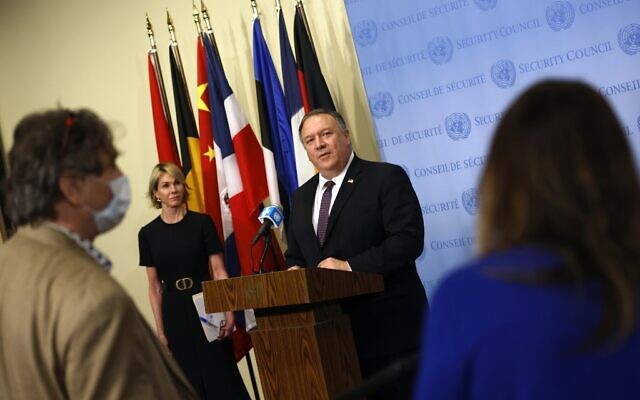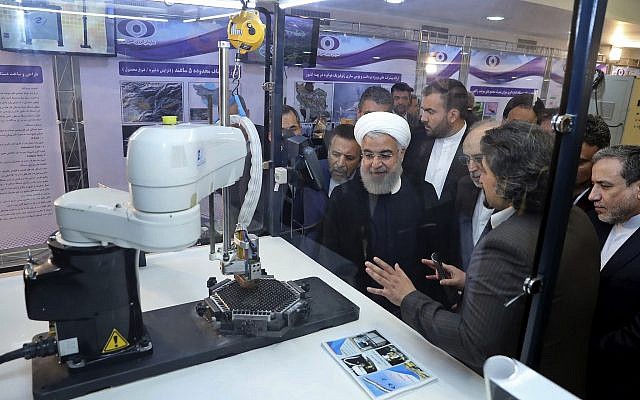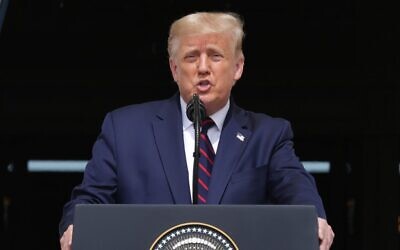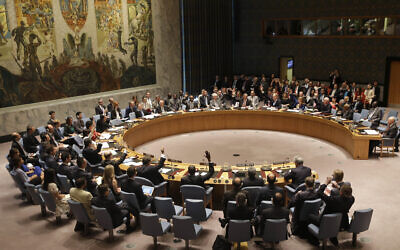T. Belman. This report presents the issue as a legal one. In reality it is an ethical one. The US wants to stop Iran from getting the bomb and purchasing weapons. The rest of the world except Israel and the Gulf States, prefers to sell them weapons.
Move forcefully opposed by most countries, except for Israel and Gulf, and expected to be ignored by rest of Security Council, which could undermine credibility of world body
By AP

US Secretary of State Mike Pompeo is flanked by US Ambassador to the United Nations Kelly Craft as he speaks to reporters following a meeting with members of the UN Security Council about Iran’s alleged non-compliance with a nuclear deal and calling for the restoration of sanctions against Iran at United Nations headquarters in New York, August 20, 2020. (MIKE SEGAR / POOL / AFP)
WASHINGTON — In defiance of overwhelming opposition, the United States is preparing to declare that all international sanctions against Iran have been restored. Few countries believe the move is legal, and such action could provoke a credibility crisis at the United Nations.
Virtually alone in the world on the matter save for Israel, the Trump administration will announce on Saturday that UN sanctions on Iran eased under the 2015 nuclear deal are back in force, after invoking a “snapback” clause despite having pulled out of the landmark pact.
The other members of the UN Security Council, including US allies, say the US lost the right to trigger a return to sanctions and have vowed to ignore the step. That sets the stage for ugly confrontations as the world body prepares to celebrate its 75th anniversary at a coronavirus-restricted General Assembly session next week.
The question is how the Trump administration will respond to being ignored. It already has slapped extensive sanctions on Iran, but could impose penalties on countries that don’t enforce the UN sanctions it claims to have reimposed. A wholesale rejection of the US position could push the administration, which has already withdrawn from multiple UN agencies, organizations and treaties, further away from the international community.
In the midst of a heated campaign for reelection, US President Donald Trump plans to address Iran in a speech to the General Assembly on Tuesday. Officials say he will also touch on his brokering of agreements for Israel and the United Arab Emirates and Bahrain to normalize relations in part to solidify a regional bulwark against Iran.

In this April 9, 2018 file photo, released by an official website of the office of the Iranian Presidency, President Hassan Rouhani listens to explanations on new nuclear achievements at a ceremony to mark ‘National Nuclear Day,’ in Tehran, Iran. (Iranian Presidency Office via AP, File)
And, as he seeks to demonstrate statesmanlike credentials ahead of the election, Trump has injected another element of uncertainty into the mix by threatening to retaliate “1,000 times” harder against Iran if it attacks US personnel overseas.
His tweeted warning came earlier this week in response to a report that Iran is plotting to assassinate the US ambassador to South Africa in retaliation for the US killing of a top Iranian general at the beginning of the year. Neither Trump nor any other senior US official has confirmed such a plot exists, although they have said Iran has a long history of political assassinations.
Amid uncertainty over that, the other 14 members of the Security Council and all but about five of the UN’s 195 member states say the US lost its legal standing to act on sanctions when Trump withdrew from the nuclear accord more than two years ago. The US argues it retains the right to enact the snapback of sanctions because the council resolution that endorsed the deal refers to it as a participant.

US President Donald Trump speaks at the signing ceremony of the Abraham Accords on the South Lawn of the White House September 15, 2020 in Washington, DC. (Alex Wong/Getty Images/AFP)
“These will be valid UN Security Council (actions) and the United States will do what it always does, it will do its share as part of its responsibilities to enable peace,” Secretary of State Mike Pompeo said on Wednesday. “We’ll do all the things we need to do to ensure that those sanctions are enforced.”
Pompeo traveled to the United Nations on August 20 to formally notify the Security Council that the US was triggering snapback because Iran is not complying with the nuclear deal. He dismissed suggestions that the administration was engaged in anything legally questionable or even controversial.
He said the snapback mechanism was the “one thing that the previous administration got right” in the nuclear deal that Trump has denounced as the worst deal ever negotiated. The agreement was a signature foreign policy achievement of President Barack Obama and gave Iran billions of dollars in sanctions relief in exchange for curbs on it nuclear program.
Yet, aside from Israel and the Gulf Arab states, almost no country in the world agrees with the US. Russia and China, along with American allies Britain, France and Germany, who often disagree but remain parties to the 2015 agreement, are united in declaring the US action “illegal.”

In this photo released by the Atomic Energy Organization of Iran, spokesman of the organization Behrouz Kamalvandi, center, briefs the media while visiting Fordo nuclear site near Qom, south of Tehran, Iran, Nov. 9, 2019. (Atomic Energy Organization of Iran via AP)
Nonetheless, the US special envoy for Iran, Elliott Abrams, told reporters Wednesday that all UN sanctions would “snap back” at 8 p.m. EDT on Saturday.
”We expect all UN member states to implement their member state responsibilities and respect their obligations to uphold these sanctions,” Abrams told reporters.
“If other nations do not follow it,” he said, “I think they should be asked … whether they do not think they are weakening the structure of UN sanctions.”
Iran has responded angrily to the US bid.
“The reality is simple. The US is not a member of the nuclear deal to use the so-called snapback mechanism against Iran; even if the US were a member of the nuclear deal, it could not do the snapback without implementing its nuclear deal undertakings with a good will,” Iran’s Deputy Foreign Minister Mohsen Baharvand said on Wednesday, according to the semi-official Fars News Agency.
Iranian lawmakers have openly said the Islamic Republic will resume its nuclear activities if the sanctions are imposed.
“If the US succeeds in automatically returning the sanctions, then there will be left nothing called the nuclear deal and certainly, the Islamic Republic of Iran will discard the undertakings it was implementing under the nuclear deal,” said MP Zohreh Elahian, a member of Iranian parliament’s National Security and Foreign Policy Commission, according to Fars.
“The parliament is determined to give up the Islamic Republic of Iran’s undertakings under the nuclear deal in case the sanctions are reinstated on Saturday and our country’s peaceful nuclear industry will again continue its activities without limitations of the nuclear deal.”

In this July 20, 2015, file photo, members of the Security Council vote at United Nations headquarters on the landmark nuclear deal between Iran and six world powers. (AP/Seth Wenig, File)
UN diplomats said the three European countries remaining in the Joint Comprehensive Plan of Action, or JCPOA, who are all currently Security Council members, will likely respond by issuing a statement reiterating their position that the United States cannot trigger snapback.
Trump administration officials been attacking the 2015 nuclear deal for years. They say it is fatally flawed because certain restrictions on Iran’s nuclear activity gradually expire and will allow the country to eventually develop atomic weapons.
The UN sanctions the US is seeking to reimpose include a ban on uranium enrichment, all missile activity, and the indefinite extension of an arms embargo that would otherwise expire on Oct. 18. The Security Council rejected a US effort to extend the embargo in a lopsided vote that got support from only one country, the Dominican Republic.
Pompeo reiterated Wednesday that Iran “remains the world’s largest state sponsor of terrorism and we don’t believe that them being able to trade in weapons of war with impunity is remotely acceptable.” He called the US decision to reimpose sanctions “good for the peoples of all nations.”
But opposition to the US move is widespread and strong, including from 13 of the other 14 Security Council members.
“Under intl law you can’t withdraw from an agreement and then claim you can still benefit from its provisions. Under ‘rules-based intl order where the rules are defined by the US this seems to be OK provided it serves US interests,” Russia’s deputy UN ambassador Dmitry Polyansky tweeted.
European Union High Representative Josep Borrell, in softer terms, delivered the same message in August saying the United States “cannot be considered to be a JCPOA participant state for the purposes of possible sanctions snapback foreseen by the resolution.



And the US will trigger them and increase the pressure on Iran. Iran will then do the wrong thing and then the rest of the world will wring their hands.